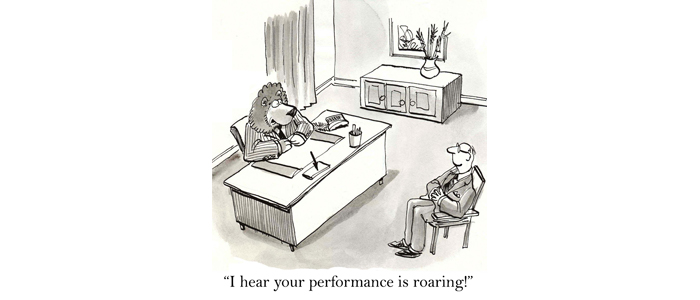What do you think of when you hear the word ‘appraisal’? I suspect it will be some version of ‘boring’, ‘meaningless’, ‘irrelevant’, ‘bureaucratic’, ‘time-consuming’ etc.
Well, we agree with you. And yet we spend an awful lot of time in our consultancy work encouraging organisations to plan work, set goals, have regular one-to-one meetings between managers and employees, and conduct performance reviews. So what’s the difference?
‘Appraisal’ in its traditional sense belongs to an era of hierarchical, top-down-managed, paternalistic organisations. If you became an employee in one of these organisations, you were expected to be grateful for it, to work hard and to have not much more input into your goals and targets than to do what you were told. As a manager in one of these organisations, you were expected to tell people what to do, keep them in line (benevolently in the best ones, brutally in the worst) and tell them at the end of a year or so what you thought of their performance – their ‘appraisal’. Like a school report.
This whole process was designed for late-Victorian organisations and a society in which these were most people’s expectations. It’s amazing to us that people still seem to think this is a valid way of managing and communicating with employees in the 21st Century. And yet we still visit organisations which operate appraisal processes that look a lot like this. People work for most of their time without clear objectives nor very much individual contact with their manager, then at the end of the year, a meeting is diarised at which they are told how they’ve done and sometimes even given a score which may have a bearing on how much they will be paid next year, or how much their end of year bonus will be. It’s a backward-looking, top-down, subjective process which bears very little relationship to the person’s actual performance, achievements and behaviour throughout the year.
So what do we recommend instead?
We recommend regular one-to-one meetings (no less often than monthly) throughout the year in which manager and employee discuss what the person’s goals and targets are, and his or her progress towards these, and how they are feeling, behaving, fitting in with the team and enjoying their work. These meetings are in addition to any work-in-progress meetings that the manager may have every week and month with his or her team. They are your opportunity to work ‘on’ the business with your immediate reports, and to give them the gift of your time and attention, rather than just working ‘in’ the business alongside them.
But, I hear you say, that means I may have to have six more meetings a month (if you manage six people). Well, yes it does – you’re a manager, and this is management. But they don’t have to be long meetings – in fact, the more you have, the shorter they can be. But they must happen and they must be one-to-one.
And they don’t have to happen in addition to any ‘appraisal’ process you may have been operating. This performance planning and review process is performance management. Just have every third or fourth meeting be a slightly more formal round-up of where you’ve got to and record your agreed summary of events. Then at the end of the year you will have three or four sets of notes to review and pull together into the end of year review.
And, until you’ve got the whole system working like clockwork with every manager and employee holding these one-to-one meetings as ‘just the way we do things around here’, don’t even think of linking the end of year review to pay or bonus. The process becomes a reward and acknowledgement of people’s performance in its own right. You’ll be amazed how much less people worry about such things as extra money when they feel fully involved in setting the direction for their own work, appreciated and given time by their manager, and confident that they are doing work which is relevant and makes a difference to the results of the organisation. Don’t knock it until you’ve tried it!
